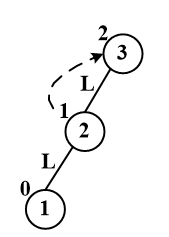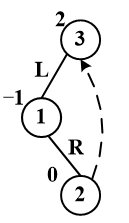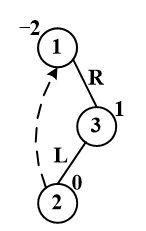AVL树(C++&Java)
目录
AVL Tree精讲专题
前言
因为AVL树之前写过一次,但是感觉左右旋转弄反了,这次重新整理了下,参照数据结构——陈越著,分别进行列举c++版本的AVL树和Java版本的AVL树,供参考和互相学习。图片来源,我们老师的PPT。
一、AVL Tree for CPP(Coding)
1.AVL树原型
C++ coding:
//AVL节点,一个左子树,一个右子树
struct node{
int val;
struct node *left,*right;
};
Java coding:
/**
* AVL节点类
*/
public class AVLNode<T extends Comparable> {
public T val;
public AVLNode left;
public AVLNode right;
/**
* constructor
* @param val
*/
public AVLNode(T val) {
this.val = val;
}
}
2.旋转的四种方式
1.singleLeftRotation LL旋转
将3,2节点对换,但是,要注意,2节点右子树可能有其他树

C++ coding:
node *singleLeftRotation(node *root){
node *t=root->left;
root->left=t->right;
t->right=root;
return t;
}
Java coding:
/**
* 左单旋
* @param root
* @return
*/
public AVLNode singleLeftRotation(AVLNode root){
AVLNode t=root.left;
root.left=t.right;
t.right=root;
return t;
}
2.singleRightRotation RR旋转
将1,2节点对换,但是,要注意,2节点左子树可能有其他树

C++ coding:
node *singleRightRotation(node *root){
node *t=root->right;
root->right=t->left;
t->left=root;
return t;
}
Java coding:
/**
* 右单旋
* @param root
* @return
*/
public AVLNode singleRightRotation(AVLNode root){
AVLNode t=root.right;
root.right=t.left;
t.left=root;
return t;
}
3.doubleLeftRightRotation LR旋转
注意双旋转,先进行下方节点旋转,所以,首先,1,2进行RR旋转,之后对3和3的左子树进行LL旋转。

C++ coding:
node *doubleLeftRightRotation(node *root){
root->left=singleRightRotation(root->left);
return singleLeftRotation(root);
}
Java coding:
/**
* 左右双旋
* @param root
* @return
*/
public AVLNode doubleLeftRightRotation(AVLNode root){
root.left=singleRightRotation(root.left);
return singleLeftRotation(root);
}
4.doubleRightLeftRotation RL旋转
首先,2,3进行LL旋转,之后对1和1的右子树进行LL旋转。

C++ coding:
node *doubleRightLeftRotation(node *root){
root->right=singleLeftRotation(root->right);
return singleRightRotation(root);
}
Java coding:
/**
* 右左双旋
* @param root
* @return
*/
public AVLNode doubleRightLeftRotation(AVLNode root){
root.right=singleLeftRotation(root.right);
return singleRightRotation(root);
}
插入代码
我们插入时,首先判断是否是空树,是空树就进行填充。之后进行左右递归插入(与BST树插入效果一样),紧接着我们需要进行一次判断,在左侧插入时,如果插入值比左孩子值还要小,那么,是LL了,进行LL旋转,如果比左孩子值大,那么进行LR旋转。右侧插入同理。
C++ coding:
node *insert(node *root,int val){
if(root==NULL){
root=new node();
root->val=val;
root->left=NULL;
root->right=NULL;
}else if(val<root->val){
root->left=insert(root->left,val);
if(getHeight(root->left)-getHeight(root->right)==2)
root=val<root->left->val ? singleLeftRotation(root):doubleLeftRightRotation(root);
}else{
root->right=insert(root->right,val);
if(getHeight(root->left)-getHeight(root->right)==-2)
root=val>root->right->val ? singleRightRotation(root):doubleRightLeftRotation(root);
}
return root;
}
Java coding:
/**
* 插入方法
* @param val 插入变量
*/
public void insert(T val){
root=insert(root,val);
}
/**
* 插入辅助方法
* @param root
* @param val
* @return
*/
private AVLNode<T> insert(AVLNode root, T val) {
if(root==null){
//空树插入
root=new AVLNode(val);
}else if(val.compareTo(root.val)<0){
//小于根进行左插入
root.left=insert(root.left,val);
//旋转操作
if((getHeight(root.left)-getHeight(root.right))==2){
root=val.compareTo(root.left.val)<0 ? singleLeftRotation(root):doubleLeftRightRotation(root);
}
}else{
//大于根进行右插入
root.right=insert(root.right,val);
//旋转操作
if((getHeight(root.left)-getHeight(root.right))==-2) {
root = val.compareTo(root.right.val) > 0 ? singleRightRotation(root) : doubleRightLeftRotation(root);
}
}
return root;
}
二、完整版AVL Tree的CPP和JAVA实现
AVL Tree CPP FULL Coding
这边加入了先序遍历和高度检测,代码可直接运行。
#include <iostream>
using namespace std;
struct node{
int val;
struct node *left,*right;
};
node *singleLeftRotation(node *root){
node *t=root->left;
root->left=t->right;
t->right=root;
return t;
}
node *singleRightRotation(node *root){
node *t=root->right;
root->right=t->left;
t->left=root;
return t;
}
node *doubleLeftRightRotation(node *root){
root->left=singleRightRotation(root->left);
return singleLeftRotation(root);
}
node *doubleRightLeftRotation(node *root){
root->right=singleLeftRotation(root->right);
return singleRightRotation(root);
}
int getHeight(node *root){
if(root==NULL) return 0;
return max(getHeight(root->left),getHeight(root->right))+1;
}
node *insert(node *root,int val){
if(root==NULL){
root=new node();
root->val=val;
root->left=NULL;
root->right=NULL;
}else if(val<root->val){
root->left=insert(root->left,val);
if(getHeight(root->left)-getHeight(root->right)==2)
root=val<root->left->val ? singleLeftRotation(root):doubleLeftRightRotation(root);
}else{
root->right=insert(root->right,val);
if(getHeight(root->left)-getHeight(root->right)==-2)
root=val>root->right->val ? singleRightRotation(root):doubleRightLeftRotation(root);
}
return root;
}
void preOrder(node *root){
if(root==NULL) return;
printf("%d ",root->val);
preOrder(root->left);
preOrder(root->right);
}
int main(){
int n,val;
scanf("%d",&n);
node *root=NULL;
for(int i=0;i<n;i++){
scanf("%d",&val);
root=insert(root,val);
}
preOrder(root);
system("pause");
return 0;
}
AVL Tree JAVA FULL Coding
1.AVL节点类
package test;
/**
* AVL节点类
*/
public class AVLNode<T extends Comparable> {
public T val;
public AVLNode left;
public AVLNode right;
/**
* constructor
* @param val
*/
public AVLNode(T val) {
this.val = val;
}
}
2.AVL树类
package test;
/**
* AVL Tree类
* 维持平衡的AVL树
* @param <T>
*/
public class AVLTree<T extends Comparable> {
public AVLNode<T> root;
/**
* 插入方法
* @param val 插入变量
*/
public void insert(T val){
root=insert(root,val);
}
/**
* 插入辅助方法
* @param root
* @param val
* @return
*/
private AVLNode<T> insert(AVLNode root, T val) {
if(root==null){
//空树插入
root=new AVLNode(val);
}else if(val.compareTo(root.val)<0){
//小于根进行左插入
root.left=insert(root.left,val);
//旋转操作
if((getHeight(root.left)-getHeight(root.right))==2){
root=val.compareTo(root.left.val)<0 ? singleLeftRotation(root):doubleLeftRightRotation(root);
}
}else{
//大于根进行右插入
root.right=insert(root.right,val);
//旋转操作
if((getHeight(root.left)-getHeight(root.right))==-2) {
root = val.compareTo(root.right.val) > 0 ? singleRightRotation(root) : doubleRightLeftRotation(root);
}
}
return root;
}
/**
* 左单旋
* @param root
* @return
*/
public AVLNode singleLeftRotation(AVLNode root){
AVLNode t=root.left;
root.left=t.right;
t.right=root;
return t;
}
/**
* 右单旋
* @param root
* @return
*/
public AVLNode singleRightRotation(AVLNode root){
AVLNode t=root.right;
root.right=t.left;
t.left=root;
return t;
}
/**
* 左右双旋
* @param root
* @return
*/
public AVLNode doubleLeftRightRotation(AVLNode root){
root.left=singleRightRotation(root.left);
return singleLeftRotation(root);
}
/**
* 右左双旋
* @param root
* @return
*/
public AVLNode doubleRightLeftRotation(AVLNode root){
root.right=singleLeftRotation(root.right);
return singleRightRotation(root);
}
/**
* 获取树的高度
* @param root 传入根节点
* @return
*/
private int getHeight(AVLNode root){
if(root==null) {
return 0;
}
return (getHeight(root.left)>getHeight(root.right) ? getHeight(root.left):getHeight(root.right))+1;
}
/**
* 先序遍历
*/
public void preOrderTraserve(){
preOrderTraserve(root);
}
/**
* 先序遍历辅助方法
* @param root
*/
public void preOrderTraserve(AVLNode root){
if(root==null){
return;
}
System.out.print(root.val+" ");
preOrderTraserve(root.left);
preOrderTraserve(root.right);
}
}
3.测试用例
package test;
import java.util.Scanner;
public class TestDemo {
public static void main(String[] args) {
AVLTree<Integer> avlTree=new AVLTree();
Scanner sc=new Scanner(System.in);
System.out.println("输入你要插入节点个数:");
int num=sc.nextInt();int tmp;
while(num--!=0){
tmp=sc.nextInt();
avlTree.insert(tmp);
}
avlTree.preOrderTraserve();
sc.close();
}
}
4.测试结果截图



